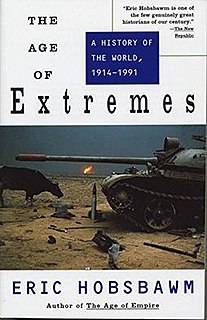 W
W1969: The Year Everything Changed is a narrative history book written by American author Rob Kirkpatrick, originally published in 2009.
 W
WThe Age of Empire: 1875–1914 is a book by the British historian Eric Hobsbawm, published in 1987. It is the third in a trilogy of books about "the long 19th century", preceded by The Age of Revolution: Europe 1789–1848 and The Age of Capital: 1848–1875. A fourth book, The Age of Extremes: The Short Twentieth Century, 1914–1991, acts as a sequel to the trilogy.
 W
WThe Age of Extremes: The Short Twentieth Century, 1914–1991 is a book by Eric Hobsbawm, published in 1994. In it, Hobsbawm comments on what he sees as the disastrous failures of state socialism, capitalism, and nationalism; he offers an equally skeptical take on the progress of the arts and changes in society in the latter half of the twentieth century.
 W
WThe Century for Young People is a non-fiction history book written by Peter Jennings and Todd Brewster. This book is an adapted version of The Century, adapted by Jennifer Armstrong. The book contains over 200 pictures to depict the 100 years of history.
 W
WThe Destruction of the Thracian Bulgarians in 1913 is a book published by the Bulgarian academic Lyubomir Miletich in 1918, which describes the mass extermination and ethnic cleansing of the Bulgarian population in Eastern Thrace and Eastern Rhodope Mountains during the Second Balkan War and in a short period after it.
 W
WThe House of Government: A Saga of the Russian Revolution is a 2017 study of the history of the Russian Revolution, the formation of the Soviet Union, and its early history from the days of the New Economic Policy into the early days of Stalinist Rule by the Russian-born American historian Yuri Slezkine. The book consists of "three strains": "The first is a family saga involving numerous named and unnamed residents of the House of Government." The second strain is analytical. It looks at the revolution and subsequent Soviet administration through the lens of the millenarian cult and "aims to capture the rise and fall of Bolshevism through a building and its residents, via a study in eschatology – the creation of an apocalyptic cult, its unexpected success, and its equally unexpected failure." "The third strain is literary...Each episode in the Bolshevik Family Saga, and each stage in the history of the Bolshevik prophecy is accompanied by a discussion of the literary works that sought to interpret and mythologize them."
 W
WIn the Spirit of Crazy Horse is a book by Peter Matthiessen which chronicles "The story of Leonard Peltier and the FBI's war on the American Indian Movement." It was first published in 1983. Leonard Peltier was convicted of murder in 1977 and sentenced to life in prison for the 1975 killing of two FBI agents, after a trial which the author and many others allege was based on fabricated evidence, widespread fraud and government misconduct.
 W
WThe Long Week-End is a social history of interwar Britain, written by Robert Graves and Alan Hodge. It was first published in 1940, just after the end of the period it treats.
 W
WModern Times: A History of the World from the 1920s to the 1980s is a book by British journalist and writer Paul Johnson, who gives an outline of world history during the 20th century from a conservative perspective. It was cited in National Review as one of the top ten books that changed America and is described as a book that has "influenced intellectual thinking on a profound level". It was first published in 1983 and has since been reissued and updated.
 W
WNo Place of Grace: Antimodernism and the Transformation of American Culture, 1880–1920 is a history book written by Jackson Lears about American antimodernism at the turn of the 20th century.
 W
WPeace in Their Time: The Origins of the Kellogg-Briand Pact is a 1952 book by historian Robert H. Ferrell tracing the diplomatic, political and cultural events in the aftermath of World War I which led to the Kellogg–Briand Pact of 1928, an international agreement to end war as a means of settling disputes among nations. Ferrell's first book, Peace in Their Time elaborates on and extends Ferrell's 1951 Ph.D. dissertation, The United States and the Origins of the Kellogg-Briand Pact, which won Yale's John Addison Porter Prize for original scholarship. Peace In Their Time itself went on to win the American Historical Association's 1952 George Louis Beer Prize for outstanding historical writing. Ferrell would go on to become a professor at Indiana University and one of the most prominent historians in America, and wrote or edited more than 60 other books on historical topics. Historian Lawrence Kaplan praised Peace in Their Time as a harbinger of the high quality of Ferrell's subsequent career, stating that it "contained the special qualities that animated all his future work."
 W
WPostwar: A History of Europe Since 1945 is a 2005 non-fiction book written by British historian and scholar Tony Judt who specialised in European history. The book examines six decades of European history from the end of World War II in 1945 up to 2005.
 W
WThe Proud Tower: A Portrait of the World Before the War, 1890-1914 is a 1966 book by Barbara Tuchman, consisting of a collection of essays she had published in various periodicals during the mid-1960s. It followed the publication of the highly successful The Guns of August. Each chapter deals with a different country, theme, and time. Two chapters are about British governments in 1895 and 1910; one chapter is dedicated to the Dreyfus Affair in France; and another is nominally about the Wilhelmine politics of late 19th-century Germany, but is really about German music and culture in that period. Other chapters cover the United States, the Hague Conventions of 1899 and 1907, the anarchist movement of the late 19th and early 20th centuries, and the activities of the Socialist International and trade unions.
 W
WThe Spanish Civil War and the British Left: Political Activism and the Popular Front is a 2007 book by Lewis H. Mates.
 W
WUnlikely Warriors: The British in the Spanish Civil War and the Struggle Against Fascism is a history book by Richard Baxell about British people who served in the International Brigades during the Spanish Civil War. It was published by Aurum Press in 2012.
 W
WThe Wise Men: Six Friends and the World They Made is a non-fiction book authored by Walter Isaacson and Evan Thomas. Published by Simon & Schuster in 1986, it describes the actions of a group of U.S. federal government officials and members of the East Coast foreign policy establishment. Starting in the immediate post-World War II period, the group developed the containment policy of dealing with the Communist bloc during the Cold War. They also helped to craft institutions and initiatives such as NATO, the World Bank, and the Marshall Plan. An updated edition of the book was released in 2012,.
 W
WThe World That Never Was: A True Story of Dreamers, Schemers, Anarchists, and Secret Agents is a 2010 book by Alex Butterworth about anarchism in the late 19th and early 20th centuries in Europe and the United States.
 W
WAppeasing Hitler: Chamberlain, Churchill and the Road to War, is a 2019 book by Tim Bouverie about the British policy of appeasement of Hitler in the 1930s.